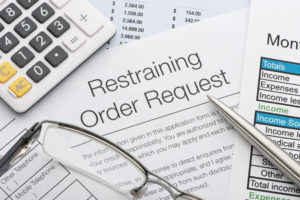It is common for an alleged victim in a domestic violence case to seek a restraining order. This makes it illegal for the alleged perpetrator to go within a certain number of feet of their alleged victim, as well as the home and place of work of the alleged victim even if the victim is not there at the time. The restraining may also forbid the accused from contacting the victim at all, whether by phone, email, text, or any other form of communication. In most cases, the alleged perpetrator will also not be able to legally buy or possess a gun while the restraining order remains active.
These restrictions can be devastating for the person accused of domestic violence. If the alleged victim is their spouse or domestic partner, then they may be required to move out of their home. If they have children together, then the alleged perpetrator may not be able to see their children during restraining order. As a result, many people wonder: How long will the restraining order last?
The answer depends on a variety of factors. Keep reading to learn more about them and then contact Law Office of Michael L. Fell at (949) 585-9055 if you are in need of a free legal consultation.
The Different Types of Restraining Orders
An Emergency Protective Order, often referred to as just an EPO, can be issued without either party ever going to court. If law enforcement is called a residence, then the officer can contact a judge directly and ask for an EPO. This order takes place immediately and lasts for as long as seven days. The purpose is to give the alleged victim protection while they go through the process of obtaining a longer-term domestic violence restraining order (DVRO).
If it takes longer than a week for the court to hold a DVRO hearing, then a temporary restraining order (TRO) can be issued at what’s known as an ex parte hearing. Essentially, this is a court date that happens if one party needs fast and immediate intervention from the court.
A Hearing is Required for the Issuance of a DVRO
A court hearing is required for a DVRO to be issued. The party who has been under the EPO or TRO must have been served (i.e. notified) regarding the time, date, and other information regarding the restraining order. If the judge decides that there is evidence of threats or actual physical or emotional abuse, then they may issue the DVRO.
If the judge does issue the DVRO, then it could last as long as five years. Once it expires, the alleged victim can apply to have it extended. As you can see, this is a long-term situation that requires the help of a qualified attorney. You can reach Law Office of Michael L. Fell at (949) 585-9055 now for a free legal consultation from a criminal defense attorney.


